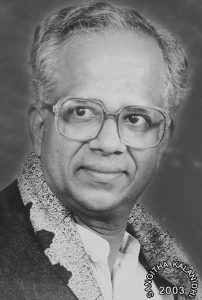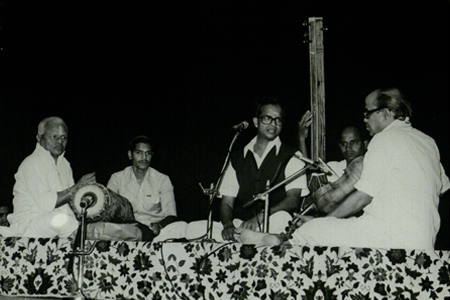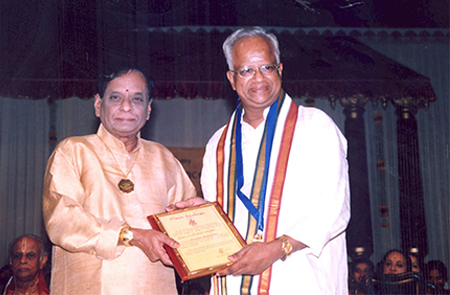
The 7th of March was the birth anniversary of the late T.V. Sankaranarayanan who passed away at the age of 77, on 2nd September 2022 in Chennai. He was conferred the birudu of Sangita Kalanidhi in 2003 during the 77th annual conference of the Academy.
Born on 7th March 1945 at Mayiladuthurai in Tamil Nadu, Sankaranarayanan was highly influenced in his formative years by the music of his maternal uncle, the great Madurai Mani Iyer, from whom also he learnt Carnatic music. His father T.S. Vembu Iyer was a disciple of the titan and his supporting vocalist as well. Sankaranarayanan started singing with his uncle and father, at the age of fifteen. Concurrent with his academic education, including degrees in Commerce and Law, his music training continued and blossomed. He opted for a full-time musical career in the late sixties. Given his talent, he stepped in to fill the void created by the demise of Madurai Mani Iyer.
Sankaranarayanan was the inheritor of a style, which can justly be called the “Madurai Mani bani” of singing. The passion of his mentor was evident in his singing. He embellished what he learnt, with his individualistic improvisations and full-throated robustness. His approach to singing was known for spontaneous “bhava”. Technique is important in this style, which can be perceived even in the pauses. The depth and magnitude of the Carnatic music tradition is well developed in this bani.
Sankaranarayanan was renowned for his repertoire and perfection of details. His raga alapanas were dynamic and exciting as he touched the high notes with clarity and precision. His rendition of the songs of great composers was authentic. The lilting swara-singing which was the hallmark of his style was always captivating. With a good command of all the ghana ragas, he was able to maintain a perfect balance in his concerts of both the improvisational and the traditional aspects of music.
Whie his music was well rooted in the rich classical foundations of Carnatic music, he was unafraid of introducing new compositions with his inimitable touch. Hard work, professionalism, and an eye towards the “rasikas” helped TVS (as he was popularly mentioned) to gain a firm footing in the concert circuit in India and abroad.
Sankaranarayanan received many titles and awards, including the Sangeet Natak Akademi Award, and the Padma Bhushan. His association with the Music Academy was a long one – where he rose from the ranks to the ultimate honour of being conferred the Sangita Kalanidhi, which was bestowed on him for his individual excellence and as a tribute to his lineage, which includes Madurai Mani Iyer, Madurai Pushpavanam and Ramaswamy Iyer.


# In his Sangita Kalanidhi acceptance speech delivered in Tamil, vidwan T.V. Sankaranarayanan recalled the long relationship that his family shared with the Music Academy. In 1927, his maternal grandfather, Ramaswamy Iyer, had presented a research paper on the 72 melakartas, with practical demonstration by TVS’s uncle Madurai Mani Iyer; for which they had received the gold medal. Madurai Mani Iyer had sung in the Academy concerts every year till his demise, so had Sankaranarayanan for decades.
# He recalled with pride that in 1959, when his guru and uncle Madurai Mani Iyer was honoured with the birudu of Sangita Kalanidhi, TVS had the good fortune of reading out the presidential speech on his behalf. By God’s grace, he now had the rare opportunity of presenting the presidential address for the second time – this time his very own.
# Talking about Madurai Mani Iyer’s musical greatness, TVS shared his uncle’s “golden advice” for musicians, which has stood the test of time: Learn and practice the abhyaasa music lessons to build a strong foundation; adhere to sruti; care for the voice; learn the compositions of the music trinity – especially that of Tyagabrahmam. To develop “kelvi gnanam” one must listen to kutcheris of senior vidwans. Listening to one such good concert is equal to ten days of sadhakam! While adhering to your guru’s bani, adapt some good points which suit your voice and sruti.
# Drawing upon his experience, he advised students of music to inculcate deiva bhakti, guru bhakti, confidence, sincerity, respect, simplicity and humility. He exhorted them to practice earnestly – do sadhakam, and to follow the royal path of the elders who had toiled without an eye on the fruits of labour. He pointed out that to safeguard and maintain the purity and classicism of our music, one must be a “pazhamai virumbi” or traditionalist to some extent.
# He expressed his gratitude for his rise to fame to his rich musical lineage, his gurus, his rasikas, his patrons, family, and the blessings of his kuladeivam “Lord Govindan”.
(Edited excerpts from the Music Academy Souvenir, 2003)